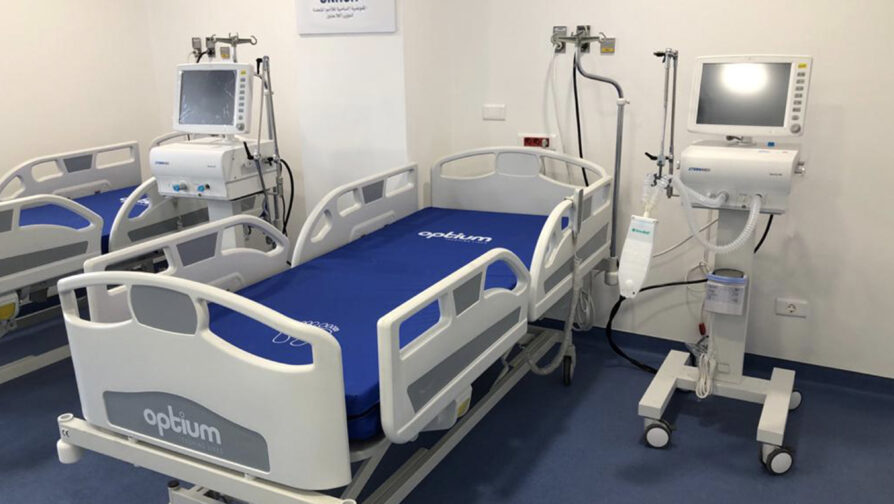UNHCR donates life-saving equipment to hospitals in Lebanon amid critical COVID-19 situation
UNHCR, the UN Refugee Agency has provided 20 additional Intensive Care Unit (ICU) beds and 122 hospital beds to hospitals across Lebanon to help alleviate the strain on the Lebanese healthcare system and help it cope with the sharp increase in COVID-19 cases in need of urgent medical care.
UNHCR, the UN Refugee Agency has provided 20 additional Intensive Care Unit (ICU) beds and 122 hospital beds to hospitals across Lebanon to help alleviate the strain on the Lebanese healthcare system and help it cope with the sharp increase in COVID-19 cases in need of urgent medical care.

The equipment was donated as part of UNHCR’s overall COVID-19 support to 13 hospitals across Lebanon, with a total of 100 ICU beds (including beds, ventilators, monitors, central stations) and 800 hospital beds, in addition to 8 dialysis units for COVID-19 patients in need of renal dialysis.
“For UNHCR, the COVID-19 response is about saving lives. We started responding to COVID-19 very early on, and our efforts have been centered on ensuring that all communities in Lebanon – Lebanese, refugees, and others – will have timely access to lifesaving treatment”, said UNHCR’s Representative in Lebanon, Mr. Ayaki Ito.
He added: “This is a particularly testing time for the healthcare system in Lebanon. With the surge in COVID-19 patients requiring urgent hospital care in recent weeks, UNHCR teams rushed to provide additional lifesaving equipment to overwhelmed hospitals across the country”.

Since February 2020, UNHCR’s COVID-19 response in Lebanon has revolved around three pillars: prevention, containing transmission, and treatment and case management.
The recent contributions complement earlier efforts deployed by UNHCR, in close collaboration with the Ministry of Public Health, the World Health Organization (WHO), local authorities, and other partners, to support the national response. They include the establishment of isolation facilities across the country, additional resources deployed to the Ministry of Public Health’s COVID-19 call centre, fuel to ensure uninterrupted power in hospitals receiving COVID-19 patients, the provision of medicine and rehabilitation and expansion works in the supported hospitals.
Mr. Ito concluded: “We are far from winning the fight against COVID-19, and no one is truly safe until all communities are safe. UNHCR is committed to continuing its support to the national COVID-19 response in Lebanon and will spare no effort in providing lifesaving assistance to those in need”.
UNHCR dedicated US$ 31.4 million to its COVID-19 response in Lebanon in 2020.
-END-
Notes for editors
Since February 2020, UNHCR teams worked around the clock to capacitate and empower refugees to limit infection and transmission within their families and the community.
UNHCR teams have set up and supported isolation facilities, as well as provided related guidance in over-crowded settings where individuals might not have the possibility to isolate at home. Seven isolation facilities with a capacity of 431 beds across Lebanon are currently operational and can receive any COVID-19 patient – regardless of nationality – who needs to isolate and cannot do so at home.
UNHCR also provided human resources support to the national Ministry of Public Health COVID-19 call centre. Ten additional nurses were trained by UNHCR and continue to serve as operators in the call centre.
As part of its winter assistance programme, UNHCR extended 1.2 million litres of fuel support to 17 hospitals receiving COVID-19 patients across Lebanon to ensure uninterrupted power generation.
For more information about UNHCR’s COVID-19 response: www.unhcr.org/lb/corona
The hospitals that received COVID-19 equipment support from UNHCR:
- Rafic Hariri University Hospital
- Baadba Governmental Hospital
- Halba Governmental Hospital
- Tripoli Governmental Hospital
- Zahle Governmental Hospital
- Mashghara Governmental Hospital
- Riyak Hospital
- Baalbek Governmental Hospital
- Saida Governmental Hospital
- Nabatiyeh Governmental Hospital
- Al Assi Hospital
- Saydet Zgharta Hospital
- Saint Georges Hospital
Media contact
Lisa Abou Khaled, [email protected], +961 71 880 070
شارك على الفيسبوك شارك على تويتر
